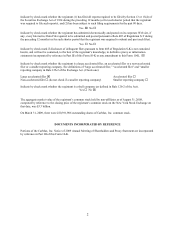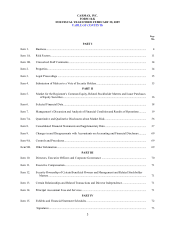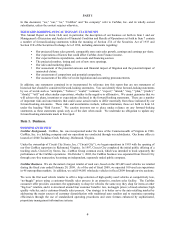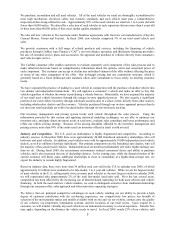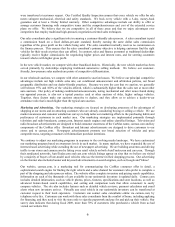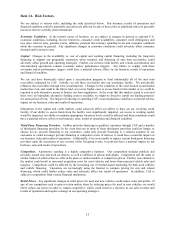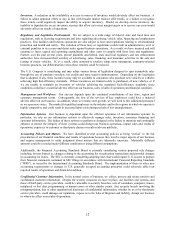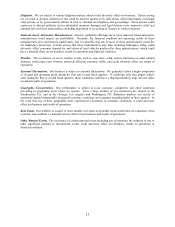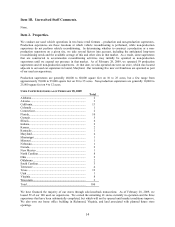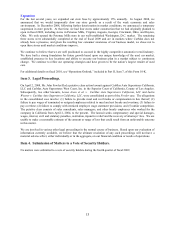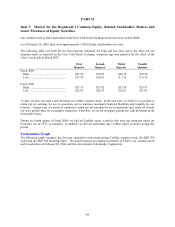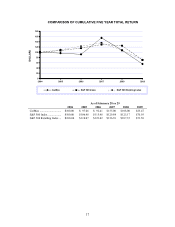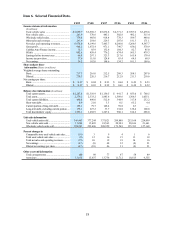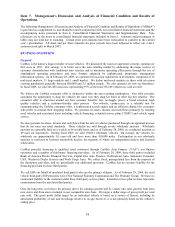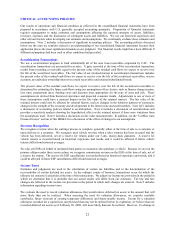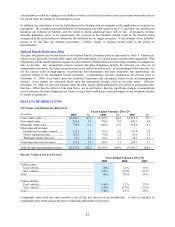CarMax 2009 Annual Report Download - page 18
Download and view the complete annual report
Please find page 18 of the 2009 CarMax annual report below. You can navigate through the pages in the report by either clicking on the pages listed below, or by using the keyword search tool below to find specific information within the annual report.12
Inventory. A reduction in the availability or access to sources of inventory would adversely affect our business. A
failure to adjust appraisal offers to stay in line with broader market trade-in offer trends, or a failure to recognize
those trends, could negatively impact the ability to acquire inventory. Should we develop excess inventory, the
inability to liquidate the excess inventory at prices that allow us to meet margin targets or to recover our costs would
adversely affect our results of operations.
Regulatory and Legislative Environment. We are subject to a wide range of federal, state and local laws and
regulations, such as licensing requirements and laws regarding advertising, vehicle sales, financing and employment
practices. Our facilities and business operations are also subject to laws and regulations relating to environmental
protection and health and safety. The violation of these laws or regulations could result in administrative, civil or
criminal penalties or in a cease-and-desist order against business operations. As a result, we have incurred and will
continue to incur, capital and operating expenditures and other costs to comply with these laws and regulations.
Further, over the past several years, private plaintiffs and federal, state and local regulatory and law enforcement
authorities have increased their scrutiny of advertising, sales, financing and insurance activities in the sale and
leasing of motor vehicles. If, as a result, other automotive retailers adopt more transparent, consumer-oriented
business practices, our differentiation versus those retailers could be reduced.
The U.S. Congress is considering and may adopt various forms of legislation designed to spur automobile sales
through the use of purchase vouchers, tax credits and mass transit reimbursements. Depending on the legislation
that is adopted, if any, these incentives may only be available to consumers who purchase new vehicles or vehicles
achieving high fuel-efficiency standards. If these incentives are limited solely to purchasers of new vehicles, or if
we are unable to maintain an inventory of vehicles achieving the mandated fuel-efficiency standards, these
conditions could have a material adverse effect on our business, sales, results of operations and financial condition.
Management and Workforce. Our success depends upon the continued contributions of our store, region and
corporate management teams. Consequently, the loss of the services of key employees could have a material
adverse effect on our business. In addition, when we resume store growth, we will need to hire additional personnel
as we open new stores. The market for qualified employees in the industry and in the regions in which we operate is
highly competitive and could result in increased labor costs during periods of low unemployment.
Information Systems. Our business is dependent upon the efficient operation of our information systems. In
particular, we rely on our information systems to effectively manage sales, inventory, consumer financing and
customer information. The failure of these systems to perform as designed or the failure to maintain and continually
enhance or protect the integrity of these systems could disrupt our business operations, impact sales and results of
operations, expose us to customer or third-party claims or result in adverse publicity.
Accounting Policies and Matters. We have identified several accounting policies as being “critical” to the fair
presentation of our financial condition and results of operations because they involve major aspects of our business
and require management to make judgments about matters that are inherently uncertain. Materially different
amounts could be recorded under different conditions or using different assumptions.
Additionally, the Financial Accounting Standards Board is currently considering various proposed rule changes
including, but not limited to, changes relating to the accounting for securitization transactions and potential changes
in accounting for leases. The SEC is currently considering adopting rules that would require U.S. issuers to prepare
their financial statements contained in SEC filings in accordance with International Financial Reporting Standards
(“IFRS”), as issued by the International Accounting Standards Board. The implementation of these or other new
accounting requirements or changes to U.S. generally accepted accounting principles could adversely affect our
reported results of operations and financial condition.
Confidential Customer Information. In the normal course of business, we collect, process and retain sensitive and
confidential customer information. Despite the security measures we have in place, our facilities and systems, and
those of third-party service providers, could be vulnerable to security breaches, acts of vandalism, computer viruses,
misplaced or lost data, programming or human errors or other similar events. Any security breach involving the
misappropriation, loss or other unauthorized disclosure of confidential information, whether by us or by third-party
service providers, could damage our reputation, expose us to the risks of litigation and liability, disrupt our business
or otherwise affect our results of operations.


